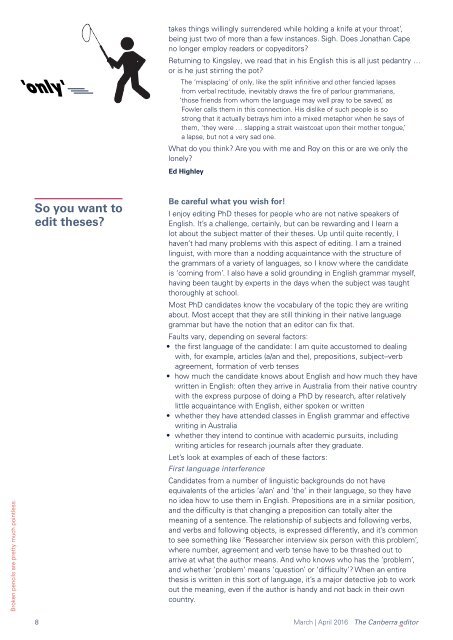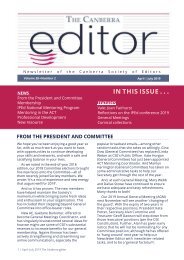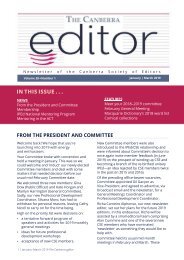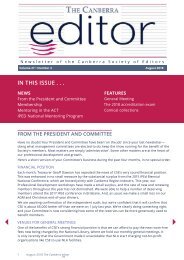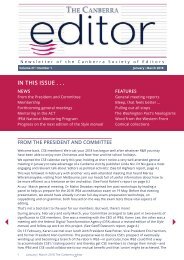The Canberra editor
Newsletter of the Canberra Society of Editors
Newsletter of the Canberra Society of Editors
You also want an ePaper? Increase the reach of your titles
YUMPU automatically turns print PDFs into web optimized ePapers that Google loves.
'only'<br />
takes things willingly surrendered while holding a knife at your throat’,<br />
being just two of more than a few instances. Sigh. Does Jonathan Cape<br />
no longer employ readers or copy<strong>editor</strong>s?<br />
Returning to Kingsley, we read that in his English this is all just pedantry …<br />
or is he just stirring the pot?<br />
<strong>The</strong> ‘misplacing’ of only, like the split infinitive and other fancied lapses<br />
from verbal rectitude, inevitably draws the fire of parlour grammarians,<br />
‘those friends from whom the language may well pray to be saved,’ as<br />
Fowler calls them in this connection. His dislike of such people is so<br />
strong that it actually betrays him into a mixed metaphor when he says of<br />
them, ‘they were … slapping a strait waistcoat upon their mother tongue,’<br />
a lapse, but not a very sad one.<br />
What do you think? Are you with me and Roy on this or are we only the<br />
lonely?<br />
Ed Highley<br />
Broken pencils are pretty much pointless.<br />
So you want to<br />
edit theses?<br />
Be careful what you wish for!<br />
I enjoy editing PhD theses for people who are not native speakers of<br />
English. It’s a challenge, certainly, but can be rewarding and I learn a<br />
lot about the subject matter of their theses. Up until quite recently, I<br />
haven’t had many problems with this aspect of editing. I am a trained<br />
linguist, with more than a nodding acquaintance with the structure of<br />
the grammars of a variety of languages, so I know where the candidate<br />
is ‘coming from’. I also have a solid grounding in English grammar myself,<br />
having been taught by experts in the days when the subject was taught<br />
thoroughly at school.<br />
Most PhD candidates know the vocabulary of the topic they are writing<br />
about. Most accept that they are still thinking in their native language<br />
grammar but have the notion that an <strong>editor</strong> can fix that.<br />
Faults vary, depending on several factors:<br />
• the first language of the candidate: I am quite accustomed to dealing<br />
with, for example, articles (a/an and the), prepositions, subject–verb<br />
agreement, formation of verb tenses<br />
• how much the candidate knows about English and how much they have<br />
written in English: often they arrive in Australia from their native country<br />
with the express purpose of doing a PhD by research, after relatively<br />
little acquaintance with English, either spoken or written<br />
• whether they have attended classes in English grammar and effective<br />
writing in Australia<br />
• whether they intend to continue with academic pursuits, including<br />
writing articles for research journals after they graduate.<br />
Let’s look at examples of each of these factors:<br />
First language interference<br />
Candidates from a number of linguistic backgrounds do not have<br />
equivalents of the articles ‘a/an’ and ‘the’ in their language, so they have<br />
no idea how to use them in English. Prepositions are in a similar position,<br />
and the difficulty is that changing a preposition can totally alter the<br />
meaning of a sentence. <strong>The</strong> relationship of subjects and following verbs,<br />
and verbs and following objects, is expressed differently, and it’s common<br />
to see something like ‘Researcher interview six person with this problem’,<br />
where number, agreement and verb tense have to be thrashed out to<br />
arrive at what the author means. And who knows who has the ‘problem’,<br />
and whether ‘problem’ means ‘question’ or ‘difficulty’? When an entire<br />
thesis is written in this sort of language, it’s a major detective job to work<br />
out the meaning, even if the author is handy and not back in their own<br />
country.<br />
8 March | April 2016 <strong>The</strong> <strong>Canberra</strong> <strong>editor</strong>


